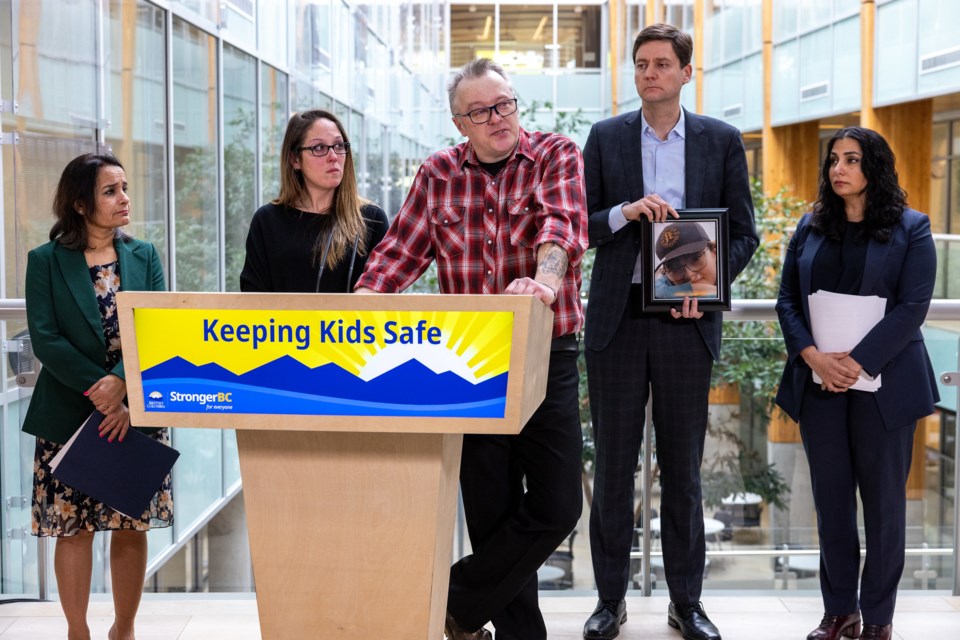There’s a bit of a magic to politics on the rare occasions you can get the right person at the right time, to do the right thing for the right reason.
So it was Friday when Premier David Eby chose to throw the weight of the state behind an effort to target social media companies that permit online sextortion, bullying and other awful behaviour against children on their platforms, in response to the suicide of a Prince George child.
Eby announced new legislation this spring that will enable the provincial government to sue social media companies for harms perpetrated against British Columbians.
The decision, as Eby explained it, came after “one of the most difficult phone calls of my time as premier” just before Christmas, with the parents of 12-year-old Carson Cleland.
Carson took his own life Oct. 12, just hours after being coaxed to send intimate images online to a person he thought was a woman, and then blackmailed for money with the threat his photos would be sent to all his friends.
Carson’s parents, Ryan Cleland and Nicola Smith, went public with his story late last year, as a warning to others.
Shortly after, Ryan’s phone rang. It was the premier.
“It was a phone call out of the blue,” Ryan said in an interview.
“Middle of the day, he called me on his personal cell phone. He wanted to talk parent to parent. There was no political angle behind it. He just wanted to share his condolences. And he promised me Carson’s death would not be in vain.”
Carson’s parents were surprised.
“He extended the offer to me: You can call anytime, even if you just want someone to listen,” said Ryan.
Politicians make promises all the time. Ryan and Nicola, who aren’t particularly political, nor are they even New Democrat supporters, weren’t sure what to make of Eby’s outreach.
For the premier, though, the call with Carson’s parents kick-started a flurry of activity inside the government, from lawyers to policy analysts to legislative drafters.
“It was a really important phone call for me,” said Eby.
“I have a nine-year-old son at home. And Ryan and I talked about a kind of dad-to-dad relationship. We understood the challenges faced by kids, by our sons in this case, but, generally, in the world right now.”
A few weeks later, in early January, the Clelands got another call. The premier was in Prince George to attend the Natural Resources Forum and wanted to meet.
“It was me, his two personal assistants and him,” Ryan said of the meeting at the civic centre.
“He didn’t tell anybody we were there. No cameras or anything. He just wanted to sit down as a parent and tell us there were changes coming.”
That led to last Friday, when Nicola and Ryan flew down to Vancouver to stand beside Eby, Attorney General Niki Sharma and Education Minister Rachna Singh to announce the new social media legislation, plus a new accelerated process to use the courts to take down intimate images shared without consent and a ban on cell phone use during school hours.
The premier held a framed photo of Carson and cried while Carson’s parents spoke at the podium beside him. He had to wipe his eyes before taking questions from the media.
“I want to make good on a commitment that I made to Carson's family when we made that first contact, which is that Carson's death would not be in vain,” said Eby.
“That our government would step up to support the heroic work done by the Clelands to raise awareness about this issue, and we would find ways to support kids to make sure that Carson leaves behind a legacy that will protect kids going into the future.”
The legislation to go after social media companies is not unprecedented.
More than 33 states in the United States are currently suing companies like Meta (the parent company of Facebook) for harming the mental health of young people with deliberate algorithms designed to addict them to their platforms.
Other sites, like TikTok, YouTube and Scribd by criminals on so-called “sextortion” — leaving instructions on how to ruin someone’s life just a search away from anyone.
“Can you imagine any other situation in our society where an environment is set up for kids where a stranger is able to walk in, take pictures of a child, threaten their safety, and the person who is providing that space, the company that is providing that space, says we have no responsibility here, this is just something that happens?” Eby asked.
In an emotional appeal, Nicola urged other children and parents to learn from Carson’s story.
“If we could offer any advice on the matter, please remember you are never alone,” she said. “There is somebody or someone, either a friend, family or teacher, that will always be there to help you.”
It’s easy to be cynical about politics these days. We live in cynical times. Extreme polarization means everyone’s motives are constantly impugned.
But Nicola and Ryan said their momentary interaction with the whirlwind provincial political machine, coming at a time of extreme grief, was surprisingly genuine.
“I was very nervous the whole time it was going to be a political angle on it, and there was nothing like that at all,” said Ryan.
“It was just a parent trying to console another parent and trying to help other children. He blew me away.
“I’m not a person who follows politics or anything. I don’t know the first thing about it. I’m not an NDP fan. I’m definitely a David Eby fan.”
Rob Shaw has spent more than 15 years covering B.C. politics, now reporting for CHEK ߣÄÌÉçÇø and writing for Glacier Media. He is the co-author of the national bestselling book A Matter of Confidence, host of the weekly podcast Political Capital, and a regular guest on CBC Radio.



